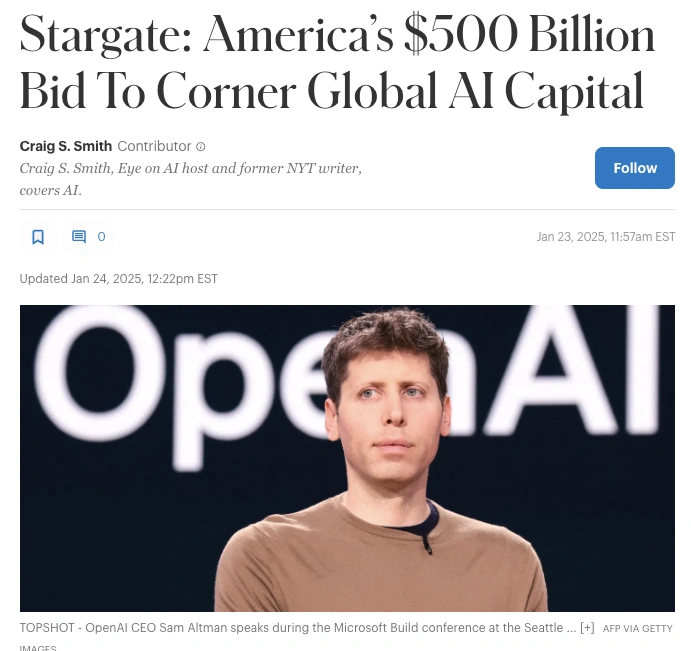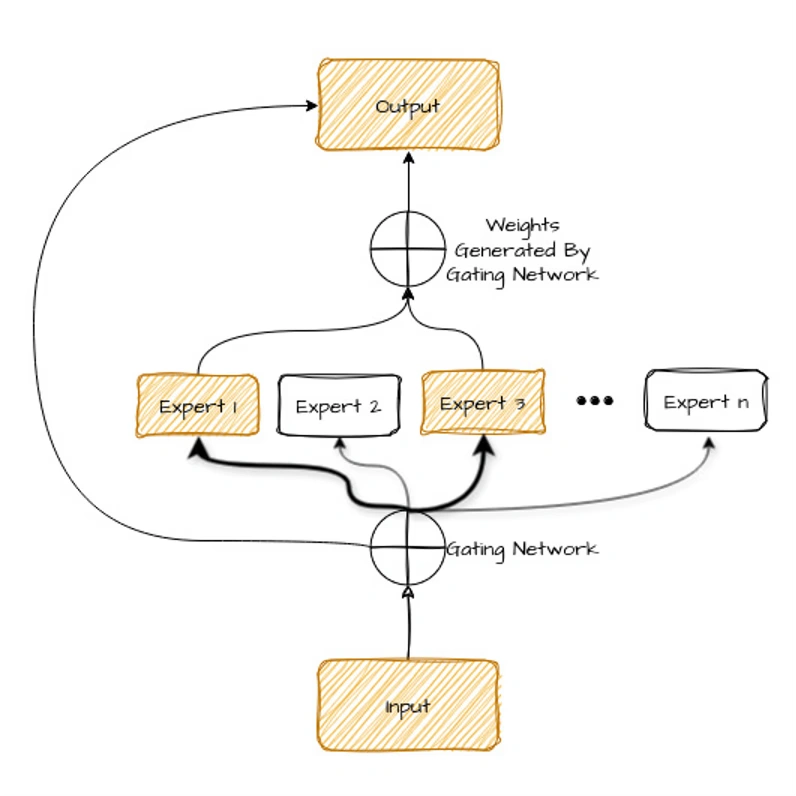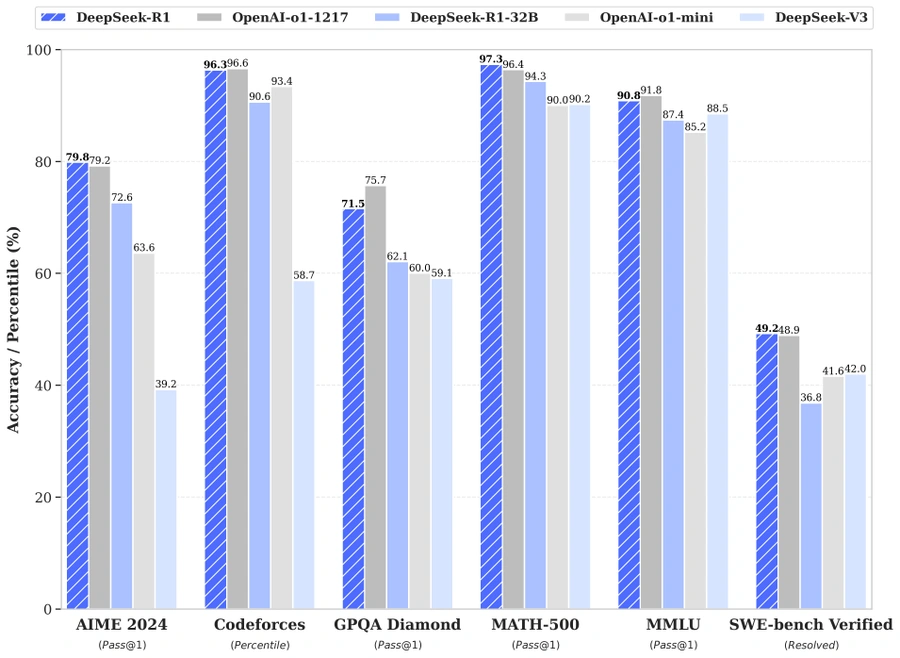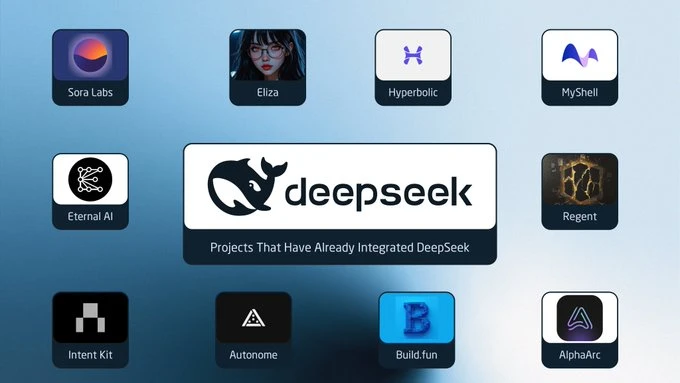The launch of DeepSeek has shocked the entire AI industry, and wiped out nearly $1 trillion of U.S. stocks within a day. How is DeepSeek different from OpenAI’s ChatGPT? How would it affect the crypto industry? DWF Ventures dives in.
What is DeepSeek?
DeepSeek is a Chinese AI startup founded by Liang Wenfeng in 2023, known for developing large language models (LLMs) that compete with established AI solutions like those from OpenAI and xAI’s Grok.
The rise of DeepSeek has alarmed the US tech industry, especially as multiple tech giants (e.g. Meta, Alphabet, Microsoft, Amazon) have been deploying billions of dollars in AI developments, while DeepSeek reported only $6 million spent. The timing of DeepSeek’s R1 launch is also mentioned to be interesting, coincidently close to the US government’s announcement of the $500 billion Stargate AI fund.

If OpenAI represents AI technological advancements from the United States, DeepSeek symbolises those from China.
In the next section, we are breaking down the differences between DeepSeek and OpenAI’s ChatGPT in terms of architecture, cost and computational power, performance, and accessibility.
DeepSeek vs. ChatGPT
Architecture
DeepSeek’s optimisation design contrasts with OpenAI’s approach, which relies heavily on computational power and hardware.
DeepSeek utilises a Mixture-of-Experts (MoE) architecture and emphasises optimisation methods such as memory compression and load balancing techniques, resulting in a 45x increase in efficiency.
On the other hand, OpenAI uses a general-purpose transformer architecture and trains on extensive, varied datasets, with estimates suggesting that the parameter count surpasses 1 trillion.

Cost and Computation Power
DeepSeek models were allegedly trained at a cost of approximately $6 million, a fraction of OpenAI’s reported costs for the o1 model. Despite lower costs, DeepSeek R1 has been highlighted for its ability to match or exceed OpenAI’s o1 model in certain benchmarks.
However, some controversies also appear in the market. Although DeepSeek claims that it only costs 2,048 Nvidia H800 GPUs to train V3, SemiAnalysis reported that the real hardware costs incurred $1.6 billion for around 50,000 NVIDIA Hopper GPUs.
Performance
DeepSeek excels in speed and specific domains, while ChatGPT outperforms in high-complexity, general-purpose tasks.
In terms of reasoning benchmark and speed, DeepSeek matches ChatGPT’s reasoning tasks with faster response time. In terms of quality and complexity, ChatGPT generally delivers higher-quality responses, excelling in nuanced, methodical reasoning.

Accessibility
DeepSeek is open-source, while OpenAI’s ChatGPT is closed-source.
DeepSeek allows developers to freely download their model’s code, and supports localised deployment. In contrast, OpenAI’s ChatGPT is proprietary, with limited sharing of underlying code or data.
How Would DeepSeek Affect Crypto?
Price Impact
The announcement of the DeepSeek’s AI model, which was both high-performing and cost-effective, led to a significant sell-off in US tech stocks, which are heavily priced in AI expectations. This sell-off had a domino effect, with crypto like Bitcoin and AI tokens experiencing declines due to the correlation between tech stocks and the crypto market.
The DeepSeek effect is likely to persist in crypto, though its impact may not be as significant compared to their R1 initial launch.
Product Integrations
Once DeepSeek R1 launched, a good amount of crypto projects have responded quickly through integrations. Here are some of the projects:

Below is the longer list of companies that announced the integration of DeepSeek into their products:
- Hey Anon
- Sora Labs
- MyShell
- Intent Kit
- Regent
- AlphaArc
- Build Fun
- Autonome
- Eliza
- Hyperbolic
- Eternal AI
- Paal Mind
- ICPanda
- OctaSpace
- Akash Network
- alice
- QAgent AI
- Destra Network
- AITECH
- Empyreal
- SI Protocol
- DEGO
- CGAI
- Block Agent
This list is not exhaustive, as the integration of AI models like DeepSeek into crypto projects are evolving rapidly. Projects like these use DeepSeek for enhancing functionalities such as smart contract automation, DeFi tools, and other AI-driven applications within their ecosystems.
Long-term Implications for AI x Crypto
DeepSeek’s model, built at a fraction of the cost of similar offerings by companies like OpenAI, suggests a future where AI technologies could become more accessible and less resource-intensive. This could potentially benefit AI crypto applications and make such integrations more feasible for smaller projects.
Besides, DeepSeek also makes people realise that most crypto apps with integrated AI could be overvalued. However, this could ultimately be beneficial in the long term, as it encourages these projects to improve their quality and product market fit, moving beyond merely offering chatbots.
Open-Source Nature
DeepSeek’s models are open-source. This aligns with the crypto principle of open-source values and transparency, where blockchain technology ensures that all transactions are visible to anyone, fostering trust through openness.
Conclusion
The introduction of DeepSeek into the global AI arena has undeniably sent shockwaves across both the AI and cryptocurrency markets. With its cost-effective approach, DeepSeek has not only challenged the conventional wisdom that significant AI advancements require massive financial investments but also reshaped expectations about what’s possible in AI development.
The future might see a landscape where AI and crypto become even more intertwined. With DeepSeek and other AI projects potentially setting new standards for how AI can be applied in the blockchain networks, this could lead to more sophisticated crypto AI products and better user experience.
At DWF Ventures, we are actively looking for investment opportunities in the AI sector. Besides, DWF Labs has recently launched a $20 million AI Agent Fund. For founders that are interested in receiving support from our crypto venture capital fund, don’t hesitate to reach out to DWF Ventures via the form on our page.



